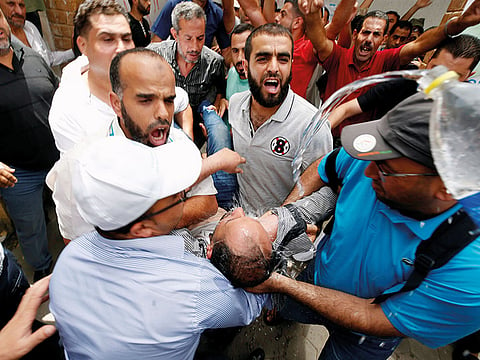US: Mideast not doing enough for Palestinians
Haley says no one ‘is more generous with their words than Palestinians’ Arab neighbours’

United Nations: US ambassador to the United Nations Nikki Haley on Tuesday criticised Middle Eastern countries for not doing enough to help Palestinians and move the peace process forward, saying that they need to “step up.”
“It is time for the regional states in particular to step up and really help the Palestinian people, instead of just making speeches thousands of miles away,” Haley said at a monthly meeting of the UN Security Council on the Middle East.
“Where are the Arab countries when it comes to encouraging reconciliation between Palestinian factions, which is essential to peace? Where are the Arab countries when it comes to denouncing Hamas terrorism? Where are the Arab countries when it comes to supporting compromises that are necessary for peace?”
“No group of countries is more generous with their words than the Palestinians’ Arab neighbours, and other OIC member states,” Haley told a UN Security Council meeting on the Middle East, citing the Organisation of Islamic Cooperation.
“But all of the words spoken here in New York do not feed, clothe, or educate a single Palestinian child. All they do is get the international community riled up,” she said.
According to IRIN, a non-profit that reports on humanitarian issues, the UAE and Kuwait were ranked in the top five most generous aid donors compared with national income globally in 2017, while the United States came in at 16. “Sometimes the numbers and facts talk for themselves,” said Kuwait’s UN Ambassador Mansour Al Otaibi.
UAE’ UN Ambassador Lana Nusseibeh agreed with Haley that real action was needed to assist the Palestinian people. “With our total donation of more than $125 million (Dh459 million) just last year, we believe that we are doing our part to address the immediate needs of the Palestinians,” she said.
Haley highlighted American assistance to the Palestinians, saying that Washington provided $300 million in bilateral aid last year, and “over six billion — with a B — dollars in bilateral assistance to Palestinians” since 1993.
She also mentioned US aid to the UN agency for Palestinian refugees (UNRWA) — but without mentioning that the total has been significantly cut.
Since January, US financing for humanitarian programmes serving Palestinians has been suspended.
“How much have the Arab countries — some of whom are wealthy countries — how much have they given to the Palestinians?” she asked.
“Last year, Iran’s contribution to UNRWA was zero. Algeria’s contribution to UNRWA was zero. Tunisia’s contribution to UNRWA was zero,” Haley said.
Her French counterpart Francois Delattre asked the US to reconsider its decision to cut aid to UNRWA, calling on Washington “to shoulder its responsibilities” to help fill the agency’s estimated $200 million gap.
Saudi Arabia has over the past two decades provided “$6 billion to the Palestinians in humanitarian assistance, development aid and relief,” its ambassador, Abdullah Al Mouallimi, responded.
And for UNRWA, it was $1 billion during the same period, he said.
Olof Skoog of Sweden, the current president of the Security Council, let his frustration with US policy show, saying: “Everyone is waiting for a credible peace plan.”
“We haven’t seen that yet. It is now about a year since we were informed about a plan and we have not seen it yet. It is a problem that there is no credible plan on the table,” Skoog said.
Meanwhile, Palestinian ambassador to the UN Riyad Mansour denounced a law passed recently by the Israeli parliament defining the country as the nation state of the Jewish people.



